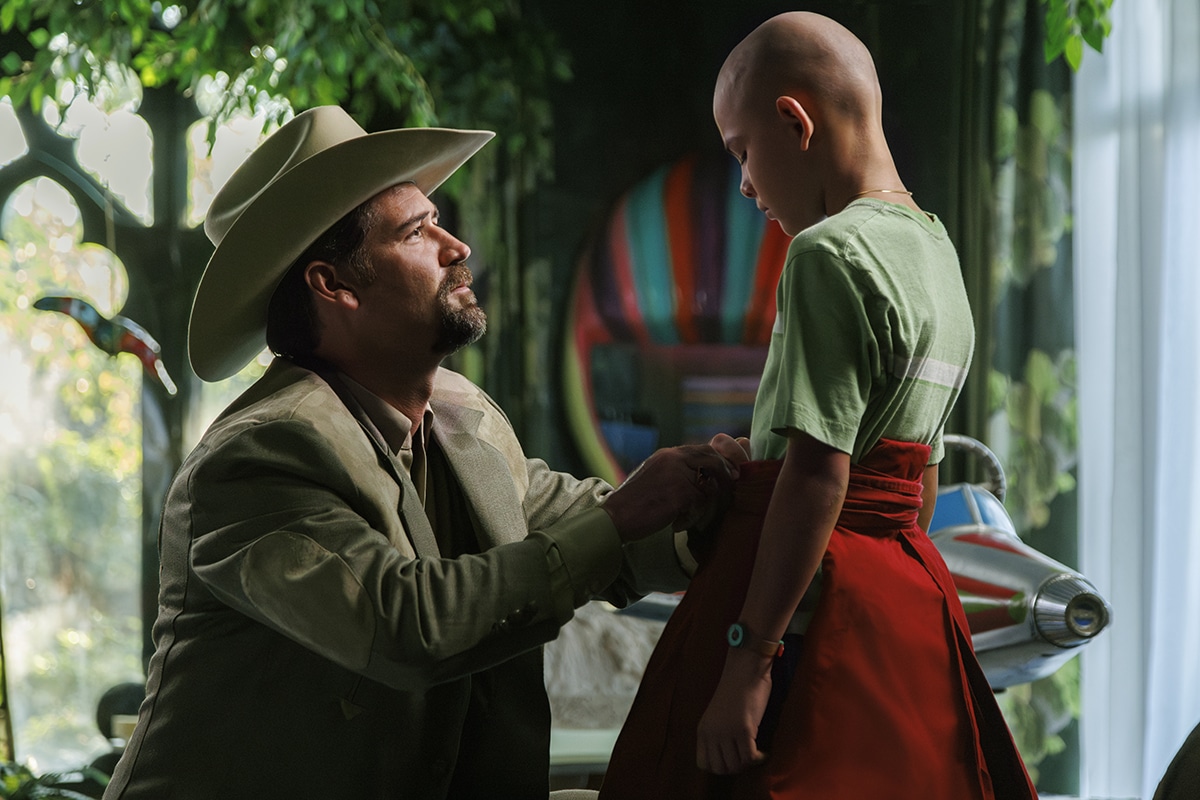Down the Rabbit Hole, originally titled Fiesta en la Madriguera, is a curious and hypnotic Mexican film that didn’t get the promotion it deserved. Based on the celebrated debut novel by Jalisco author Juan Pablo Villalobos and adapted by Oscar-winning Argentine screenwriter Nicolás Giacobone, Down the Rabbit Hole is partly the story of a lonely boy who longs to own a pygmy hippo and partly a stark look at “narco” parenthood and family legacy.
At the center of Down the Rabbit Hole is the quirky Tochtli (Miguel Valverde Uribe), an 11-year-old pre-teen who lives among the myriad luxuries afforded by his father, Yolcaut (Manuel García-Rulfo), the tough and ruthless head of the Sinaloa Cartel. Directed by Manolo Caro, acclaimed Mexican filmmaker known for La Casa de las Flores and Sagrada Familia, the film richly explores issues of atypical childhood, identity formation, and the privileges and complexities of living in a world ruled by drug trafficking. It also sheds light on the fragmented legacies that parents can pass on to their children.
The smart and pampered Tochtli lives in his “Madriguera,” a lush and remote palace populated with motley characters, including servants, thugs, ladies-in-waiting, corrupt politicians, and his father, Yolcaut. There, the boy remains oblivious to his father’s illicit activities and shady reputation.
Much of the feature follows Yocault and Tochtli as they travel across the African landscape to get their hands on hippos. The hectic excursion spirals out of control all too soon when the captured creatures become seriously ill and Yolcaut has to put them down. This fateful adventure pushes the boy to suspect that his father may not be the hero he idolizes.
Although Manolo Caro’s feature film is set against the backdrop of drug trafficking, it’s not exactly a story about criminal bravado or cartel violence, but rather about family, legacy, and self-discovery. Down the Rabbit Hole is both the tale of a father trying to keep his son from confronting the cruelty of his world too soon and the tale of a pre-teen who eventually discovers himself to be the offspring of a drug trafficker.
An Unconventional Angle
In the midst of the so-called “narco-fiction” boom – exemplified in shows like Queen of the South, El Chapo, Griselda, and Narcos – Down the Rabbit Hole approaches the sub-genre from a daring and unconventional angle. In both the book and the film, the underworld of drug trafficking is explored from the personal and psychological perspective of a child, which actively provokes the viewer’s imagination. Through Tochtli’s eyes, we witness a rarefied world where cruelty and corruption coexist with school lessons, family meals, and birthday celebrations. While there are dangerous dealings and threats, the inhumanity of the drug trafficking underworld does not overpower the film but rather sets the stage for Yocault and Tochtli’s relationship.
According to Director Caro, the film is the tale of a boy gradually discovering who his father is, showing “how [Yocault’s] bubble gets punctured and it ends up being his moment to grow up, to meet the world.”
Tochtli’s Hats
Tochtli has an indomitable predilection for hats and his collection is enviable. As the story progresses, the boy wears different hats and assumes the role of various characters, ranging from a glamorous prince to a skilled detective to Usagi, the daredevil samurai.
When Tochtli is bored, feels uncomfortable, or believes that something is missing, he adopts a different personality. His clothing, rich in symbolism, allows him to free himself from the limitations of his identity and environment and to experience the world from other perspectives.
In Down the Rabbit Hole, the act of dressing up functions as an effective means of self-expression and self-exploration. Along with the opportunity to try on a new identity, Tochtli attempts to learn more about himself and the strange world around him. Hat by hat, the boy is navigating the complexities of his world, unveiling the hidden and discovering the lies that envelop him. And Down the Rabbit Hole is at its best when it cleverly interweaves visceral conflicts between Tochtli’s childishness and the harsh reality of his father.
So, Should You Watch It?
Biting, thrilling, and self-assured, Down the Rabbit Hole is one of the most interesting Mexican films from Netflix this year. Manolo Caro’s latest feature is an amazing display of talent both in front of and behind the camera.
While we may prefer to see our Latino culture outside the context of drug trafficking, Down the Rabbit Hole is still well worth seeing. The film distinguishes itself with its powerful narrative heart, vivid and inventive photography, and exceptional performances by Manuel Garcia-Rulfo and Miguel Valverde. Raw and tender at the same time, Down the Rabbit Hole respects its source material and more than rewards the viewer’s attention.

